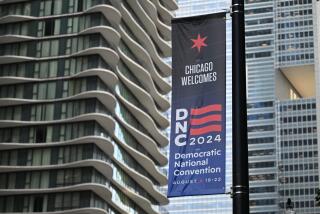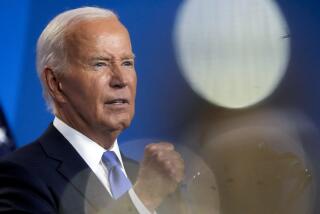Conference to serve as preview of ‘tea party’ influence in 2012
- Share via
Reporting from Washington — A dozen potential GOP presidential candidates will address the nation’s largest annual conservative gathering this week, opening a window into the likely influence of the “tea party” in choosing President Obama’s 2012 opponent.
Every four years, the Conservative Political Action Conference assumes outsize importance as potential candidates try to impress a largely youthful audience of movement activists and score high in a straw poll that ironically has proved a poor predictor of nominees.
Former Massachusetts Gov. Mitt Romney, former House Speaker Newt Gingrich, former Minnesota Gov. Tim Pawlenty, Mississippi Gov. Haley Barbour, Indiana Gov. Mitch Daniels, Rep. Michele Bachmann of Minnesota and Sen. John Thune of South Dakota are among those scheduled to appear in what is essentially three days of auditions before 11,000 hard-core conservatives. Two other possible candidates, former Alaska Gov. Sarah Palin and former Arkansas Gov. Mike Huckabee, will not attend.
Social conservatives have dominated the event, which gained prominence after Ronald Reagan became a regular speaker. Record attendance is expected for this year’s edition, which opens Thursday. Reflecting the tea party’s emergence as a new force inside the Republican Party, there will be several panel discussions on fiscal issues, featuring participation by prominent tea party organizers and politicians.
In the 2012 campaign, “I think you’ll see every candidate try to claim tea party support,” said Ryan Hecker, a Houston lawyer and tea party leader. “I think you’re going to be seeing candidates that are much more ideological on conservative issues.”
The tea party appears well positioned to build on last year’s successes. In primaries across the nation, entrenched Republicans deemed insufficiently conservative were dumped from office and replaced by tea party favorites. Tea party organizers say their members remain as energized today as they were in 2010.
“This thing couldn’t be more wide open,” Curt Anderson, a Republican strategist not yet aligned with a presidential contender, said of the GOP nomination contest. “This is probably one of those upset-the-apple-cart elections where everything goes out the window.”
Historically, Republicans have nominated the man whose “turn” it is, including both George Bushes, Bob Dole and John McCain. But the tea party has shifted the party to the right, weakened the establishment’s hold and put greater emphasis on conservative ideology. Tea party backers are more uncompromising than other Republicans, insisting that their leaders in Washington “stand up to Obama” rather than compromise, according to a Pew Research Center poll last month.
From the presidential campaign of TV evangelist Pat Robertson in 1988 through Pat Buchanan’s anti-establishment crusades in the 1990s and McCain’s initial challenge to George W. Bush in 2000, insurgent candidates have flourished during the early primaries, only to fall short.
But this time could be different. Insurgent energy is running high at the grass roots, and the Internet and social networking have diminished the importance of traditional fundraising networks. Romney, the early establishment favorite, is regarded as a particularly weak front-runner by Republican politicians.
“In 2012, we may see for the first time that it is the anti-establishment or insurgent candidate who wins. That type of persona has the best chance to become the nominee that we’ve seen, other than [Barry] Goldwater, in the modern era,” said a Republican strategist, who requested anonymity because he is privately offering advice to several likely candidates.
The tea party’s potential to shape the Republican ticket may be particularly strong in the early primary states that are likely to narrow a large field of contenders.
In Iowa, whose leadoff presidential caucuses are less than a year away, the Republican Party “is literally being taken over by the tea party,” said Dave Funk, a former tea party candidate for Congress who now serves as co-chairman of the largest county central committee in the state. Tea party enthusiasts are likely to turn out in significant numbers at next winter’s precinct caucuses, expanding the overall number of votes, he said.
In New Hampshire, the first primary, where independents can vote in the Republican contest, the tea party “will be a big factor,” predicted Mike Dennehy, architect of McCain’s 2008 campaign there.
South Carolina, the next primary state, is a tea party hotbed. It produced some of the tea party’s most impressive 2010 victories, including Nikki Haley’s election as governor after an endorsement by Palin, arguably the nation’s leading tea party politician.
But the rise of the tea party is creating strains for Republicans, who worry about how well their party is adapting to the latest influx of conservative activists. GOP leaders in Washington are already struggling to keep tea party House members in line. Intraparty divisions could be seen in the dueling responses to Obama’s State of the Union speech last month by a designated party spokesman and the tea party’s Bachmann.
As the presidential campaign gathers steam, traditional divides between social and economic conservatives are likely to be thrown into bolder relief.
Polls show that many tea party backers also identify themselves as social conservatives. But tea party groups tend to focus on issues of the economy, the federal debt, the size of government and its reach into the private lives of ordinary Americans. A nationally televised tea party town hall meeting in Washington this week began with an announcement by moderator Amy Kremer of Tea Party Express that questions about social issues wouldn’t be allowed.
More to Read
Sign up for Essential California
The most important California stories and recommendations in your inbox every morning.
You may occasionally receive promotional content from the Los Angeles Times.










